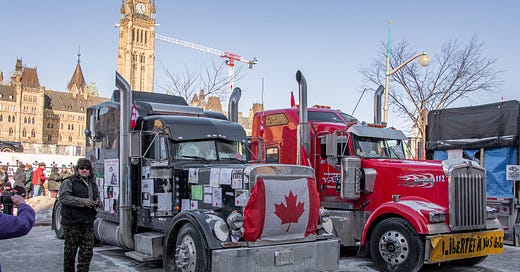My book, An Emergency in Ottawa: The Story of the Convoy Commission, is published today by Sutherland House Publishing as part of their Sutherland Quarterly periodical series. Jen and Matt at The Line have a new excerpt. Indigo offers a nice discount. Your local bookstore in Calgary, Sarnia, Ottawa and Halifax (among others) will be happy to hear from you.
I have written at this length (25,000 words, about 100 pages, roughly a quarter the length of my big Harper book) before. At Maclean’s I wrote something this big after every election from 2006 to 2015. It’s a challenge: you need to deliver something meaty and memorable, but quite soon you realize you’ll also have to manage feats of economy. Paul Rouleau heard from more than 70 witnesses. I discuss about a dozen of them. (Even Justin Trudeau makes only a cameo appearance.) Rouleau’s report is 2,000 pages long. I decided not to attempt a rebuttal at 5% of that length.
What I did do was discuss the odd institution of the public inquiry as a mechanism for assessing chaos through the comforting, but necessarily distorting, lens of process. I gave a sense of what the commission rooms felt like and how they worked. And I used witness testimony to assess how the Freedom Convoy occupation unfolded for four classes of participants: Ottawans, police, protesters, and governments.
All of them were exhausted before the story began. Two years of plague times had worn everyone out. And every group was internally divided and uncertain, very much including the convoy protesters. Many readers will find something missing in An Emergency in Ottawa, an ingredient lots of people clung to while the mess was unfolding in downtown Ottawa last February: certainty about who’s right and wrong. It’s pretty obvious everyone thought they were doing the right thing. And that too many of them used their belief in righteousness as an excuse to dismiss the concerns of others. In every group there were people who wanted to listen more broadly. They included Ottawa city manager Steve Kanellakos, convoy lawyer Keith Wilson, OPP inspector Marcel Beaudin, federal deputy minister Rob Stewart. In the end none could build a broad enough coalition for empathy across the lines of group identification. That’s not a surprise. But their efforts became a theme of my book.
In the end, An Emergency in Ottawa is an odd book, a bit old-fashioned. It ignores instincts honed by Twitter and proposes to sit, with Justice Rouleau, and listen to people who were mostly telling the truth about a moment they mostly wish had unfolded in other ways. In that, perhaps they had more in common than they realized.
I’m promoting this book because that’s what authors do, but also because it’s part of a series, and it represents a new idea in Canadian publishing. The Sutherland Quarterly series will bring a new writer to a new topic at the same 100-page length every three months for the foreseeable future. The Australian periodical on which it’s based runs to dozens of titles and boasts 9,000 subscribers, which means the writers of each new instalment can be sure of reaching a broad national audience that’s willing to take a frequent chance on ambitious long-form journalism. And, thanks to those subscribers, they can also be sure of getting paid well for it. That’s why Sutherland House founder Ken Whyte and I will reserve particular gratitude for people who subscribe to Sutherland Quarterly as well as reading my contribution.
Thanks for reading.





Huge fan of "Quarterly Essay" and delighted to see it be emulated!
It's not an issue I feel very even-handed about. I'll be glad to read it for a sense of whether I'm right that anybody attempting to be conciliatory would immediately have lost the moral-suasion power to speak for the Convoy. When Jason Kenney tried to be conciliatory, cancelling most restrictions, journalists couldn't find anybody at Coutts to speak for the blockade, but random participants questioned, indicated that the gesture was like nothing to them - that anything short of total compliance wouldn't move them. Kenney was as good a friend in power as they had, and he went under the truck the moment he was not fully-compliant. The elevation of Danielle Smith also suggests a total lack of conciliation.
But! Most journalists try to find the most-inflammatory people to quote, throw the biggest scare into their readers that they can. Many thanks for taking the opposite approach.